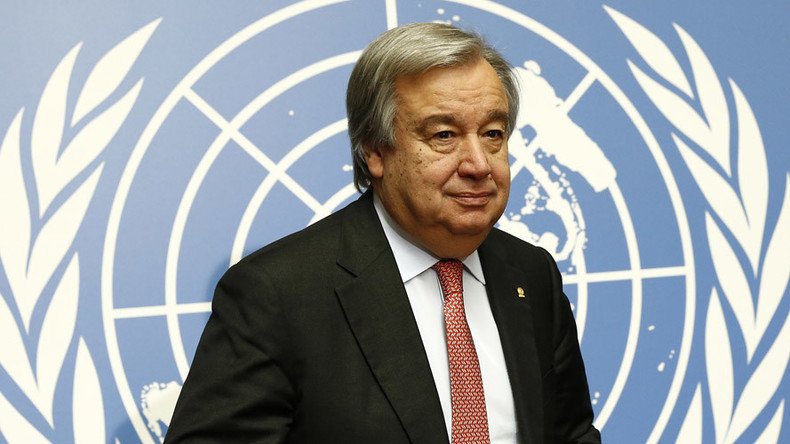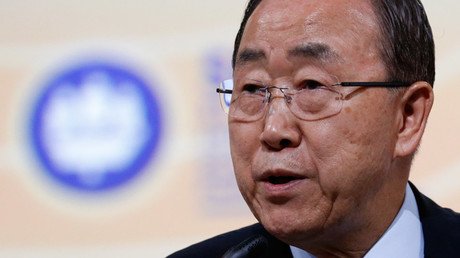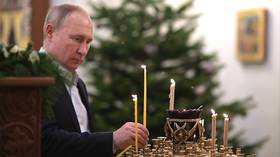‘Russia’s involvement is crucial in addressing today’s problems’ – ex UNHCR chief

Russia is a fundamental partner in efforts to bring peace and stability to the world; its involvement in addressing today’s problems is crucial, says António Guterres, ex-UN high commissioner for refugees, now candidate for UN secretary-general.
RT: The current refugee crisis is the worst since WWII. What should the UN's priority be in dealing with the flow of refugees?
António Guterres: Of course we cannot forget the need to protect them, the need to keep borders open for them, the need to make sure that we find solutions for them. But the most important is to increase the prevention of conflicts…Now more that 65 million people are displaced by conflict in the world. And we see this multiplication of new conflicts; we see old conflicts that never die.
It is absolutely essential to increase the resources, the capacities, the possibility to mobilize all those that have an influence on the parties to the conflicts in order to prevent those conflict from happening, and then in order to solve them as soon as they happen.
This is the biggest flow we have today in the international community capacity. And it is this flow that needs to be addressed with maximum priority, because better than to help refugees is to make sure that there won’t be more refugees in the future.
RT: What will your priority be if you’re elected UN secretary-general?
AG: I think that we need a surge in the diplomacy for peace. The UN has the role to play as an honest broker, as a convener in a humble way, but helping countries to come together – those that have an influence on different parties to different conflicts to come together to understand that now these are wars in which nobody is winning, everybody is losing. That became a nightmare not only for the countries involved in the war, but for the whole international community.
We see the connection between global terrorism and conflict. We see attacks in Beirut, in Paris, in Orlando, everywhere… We saw the tragic event with the Russian plane coming from Egypt. So this is something in which now there is a fundamental interest of everybody in the world to come together and to put an end to these conflicts. I see the UN can play a role in helping people come together and doing some discreet diplomacy, facilitating trust being built for the international community to be able to act as a whole and to make sure that we avoid this terrible multiplication of conflicts that we’re witnessing today.
RT: The UN has been dealing with global peace and stability for 65 years. With terrorism, the refugee crisis and climate change, is the organization still up to its mission?
AG: Obviously. There is still a long way to go. Many people in different UN organizations are doing their best. We see UN agencies delivering humanitarian aid; we see the mobilization of the international community [in response] to climate change in the Paris agreement; we see the new Agenda 2030 in relation to sustainable development. There is progress in many areas. But let’s be clear, there is still a long way to go to create the conditions of trust for all member states to be engaged in the most important objective of them all, which is to establish peace and security in our troubled world.
RT: Ban Ki-moon recently said Russia has a very important role to play, and that he counts heavily on its leadership. What's your view on that, as Russia's hasn't been a favorite in the West since the Ukrainian crisis erupted more than two years ago?
AG: Well, I do believe that Russia is an absolutely fundamental partner in all international efforts to bring more peace and stability to the world. The coordination, the cooperation between the UN and Russia and creating the conditions to increase also the trust in the relations between Russia and other powers in the world is absolutely crucial. There is no way we can address the problems of today’s world without the strong involvement of Russia. Russia’s role is absolutely essential, absolutely crucial in creating the conditions for us to be able to move forward in all key aspects of international agenda.
RT: The EU has reportedly agreed to extend economic sanctions against Russia for another six months. But we've heard from many politicians that it's now time to build bridges, not walls. What's your view?
AG: We need to increase dialogue between all key players in the international community. Russia is one of these key players; the EU is one of the key players. The US is another key player. There must be better dialogue, better cooperation, better understanding – that is the way forward.
RT: When it comes to solving the Syrian crisis, Moscow and Washington seem to agree on many things, but sparks often fly high between their envoys at the Security Council and they often don't see eye to eye. Can they find a new way or working, or are there deep-seated differences that just can't be overcome?
AG: I’ve seen Moscow and Washington come together very closely. The two are playing a very important role in creating the conditions for peace to be established in Syria. I believe that effort needs to be enlarged to other countries. Regional powers have today a very important role in the questions of peace and security. It is important to put on board also countries like Saudi Arabia, Iran and Turkey. I believe that Russia and the US are moving in the right direction, but they need to bring onboard other key partners in order to make sure that the comprehensive solution is possible…
RT: There has been a refugee deal signed between the EU and Turkey, which key aspect was to solve refugee crisis in Europe. Do you think it works properly?
AG: I am not following the deal and its evolution very closely… But the most dramatic scene for me is that the problems are not solved. The central problem is the Syrians that are suffering so much. Seeing the houses bombed, seeing the members of the families being killed, their communities being destroyed. The Syrians are now starting not to have a place to escape, starting not to have international protection evaluable for them in Europe and in the neighborhood. This is something that needs to be corrected.
That is why I have been advocating since last year and the UNHCR is advocating today for a massive resettlement program allowing Syrians to be able to restart their lives in different parts of the world with a common international effort to give an adequate answer to this immense tragedy of Syrian people.
The statements, views and opinions expressed in this column are solely those of the author and do not necessarily represent those of RT.













